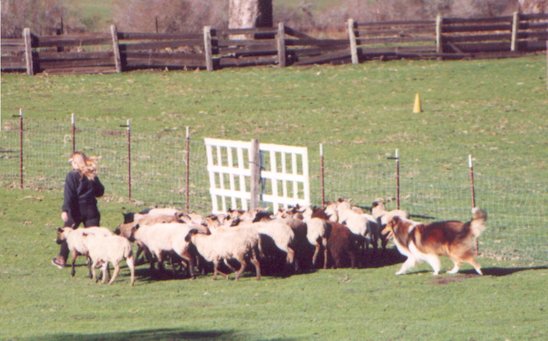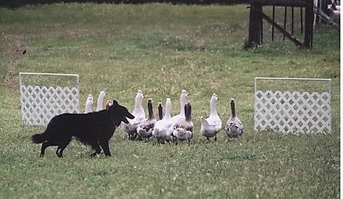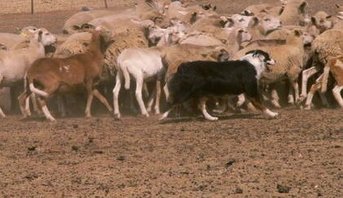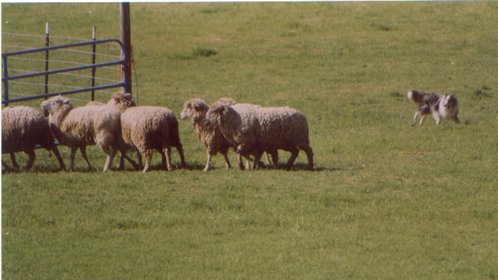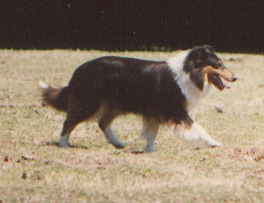RANCH/FARM AND LARGE-FLOCK HERDING TRIAL COURSES
By Linda Rorem
In contrast to the more common trial courses that have a specified, unvarying design, ranch/farm courses allow variations in layout so as to reflect and accommodate the characteristics of the particular ranch or farm where the trial takes place. The sequence of tasks likewise will vary, but within a framework of overall requirements providing some standardization. The emphasis is on practical tasks and teamwork. The Australian Shepherd Club of American and American Herding Breed Association provide ranch and farm courses, with the AHBA also providing for work on larger flocks of 25 or more head per group in its Ranch-Large Flock program. The AKC now has a ranch course as well, Course D. (There are also some classes named "ranch" in trials held by Border Collie-oriented organizations, but this class designation just reflects a level of competition, above novice but below open, not a difference in course layout.)
A special attraction of ranch courses is that they are flexible and incorporate the interest and challenge of being different from place to place and time to time. Within the overall requirements are set elements such as gathering, driving, negotiating obstacles of various kinds, settling the stock to graze, pen work, and sorting, but the sequence and details will differ at different trials. There will be work in open fields or large arenas combined with work in pens and alleyways. While the minimum number of head per group for some ranch courses may be five or ten, larger numbers of animals in a group are required in some and encouraged in others, 20 or 25, on up to 40, 80 or more when possible. Although larger numbers sometimes may not be practicable for logistics reasons, having the open-ended option is very desirable, as the animals generally feel more comfortable and move more naturally in larger groups.
Ranch courses are well-suited to sheep, goats, and cattle, and also, in a shorter form, to geese. While courses requiring a series of quick, precise maneuvers under tight control, whether in an arena or in a large open field, are fine challenges, they do not fully reflect typical ranch and farm work. Many breeds, including Rough and Smooth Collies, Old English Sheepdogs, Pyrenean Shepherds, English Shepherds, and others, were versatile farm and ranch dogs, often working larger groups of animals or animals that were somewhat accustomed to being around people and dogs so sometimes could be stubborn. There often was much scope for independent judgment on the part of the dog, while working in a close partnership. This type of work is also most reflective of droving work, where the dog kept the animals grouped, watched out for and brought back any animals that attempted to break way, kept the animals moving in the desired direction over long distances. (Note: "droving" does not mean "driving" in the sense of the dog pushing the stock in front of the handler - in droving work, the dog and handler would be in various positions around the group as needed.) A ranch/farm-type course in use for over 100 years is the traditional large-flock trial of France, and the FCI “Traditional Style” trials now being held in Europe are similar. These trials are suitable for a range of breeds and, like the American ranch courses, are set out in accordance with the features of the particular facility where the trial is taking place, with variability in course layout being allowed under the umbrella of a "menu" of required tasks and specifications.
Designing a ranch course gives ample scope for creativity and thoughtfulness. Along with flexibility, there will be a need to provide consistency, arranging the layout and tasks so as to provide an appropriate level of difficulty for the different classes while balancing acceptable variations with the standardization given by the overall requirements. Good design will provide a logical progression of elements that ideally reflect typical ranch and farm work.
Ranch/farm-type courses encourage training for accomplishment of a job rather than rote "course training" or pattern training. Experience has shown that many dogs respond very well to a task-oriented course that has an emphasis on practical accomplishment of the work, teamwork, and room for initiative and independence -- a course that may be "new" every time yet containing familiar elements. The length of the course, number and type of stock, and variability of tasks add to the challenges. Ranch/farm and French-type courses are especially suitable for the upright, loose-eyed breeds. Dogs and handlers alike greatly enjoy the practical orientation. One judge at a large-flock trial, after judging my Collie, Chelsea (Paragon Northlight Crystal, HX, HRD III-s), commented to me, “She was wagging her tail the whole time.”
For more details regarding ranch/farm and large-flock herding trial courses, visit: www.ahba-herding.org , www.asca.org , and http://images.akc.org/pdf/Course_D_Regulations_for_webpage.pdf
For more details regarding ranch/farm and large-flock herding trial courses, visit: www.ahba-herding.org , www.asca.org , and http://images.akc.org/pdf/Course_D_Regulations_for_webpage.pdf

